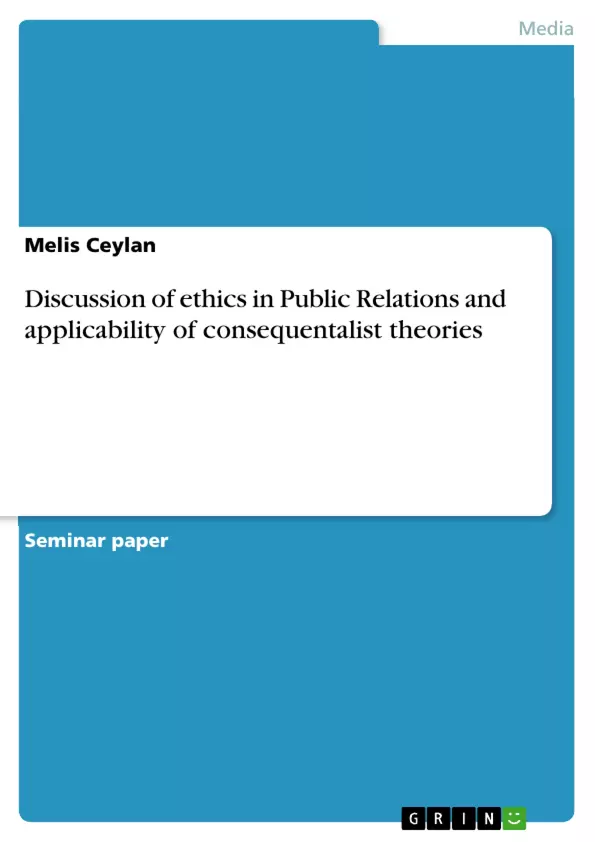INTRODUCTION
There are different kinds of theories which try to acquire a basis for ethical behaviour. Consequentialist theories are used in this essay as ethical theories for public relations. The best known consequentialist theory, utilitarianism, declares that actions of public relations practitioners must be judged by the usefulness they cause. This is also known as teleological approach, which means the study of ends.The opposite approach, deontological, focuses on the duty to respect other people’s rights (Tench and Yeomans, 2006).
Public relations ethics focuses on the ways which would help to overcome the problems of organisations within the public relations and communications (Parsons, 2004). According to Seitel (2001), public relations practitioners must consult with their clients in an ethical way. Public Relations Society of America (PRSA) has worked hard on building strong ethics mentality among its members.
This essay firstly introduces the role of public relations, practitioners’ aspects of social responsibility which enables to reach the organisational goals and the ethical media relations (Parsons, 2004). Further on, it is focused on the ethical dilemmas and decision making processes in order to discuss about whether PR practitioners make ethical decisions or not (Parsons, 2004). After this stage, teleological and deontological approaches are used to assess practitioners’ actions from utility or duty based aspects (Tench and Yeomans, 2006).
The Role of Public Relations and The Practitioners’ Aspect of Ethics
According to Tench and Yeomans (2006), Public Relations (PR) does not have one specific definition. In other words, there are some different ideas about PR which are commonly used by both the academics and practitioners. PR helps to sustain mutual communication between an organisation and its publics in order to be responsive to publics’ requests by the help of using research methods (Harlow, 1976:36 cited in Tench and Yeomans, 2006). Public Relation’s Role is explained under these headings by Parsons (2004):
Inhaltsverzeichnis (Table of Contents)
- INTRODUCTION
- The Role of Public Relations and The Practitioners' Aspect of Ethics
- Ethical Dilemmas and Decision Making Processes
- Ethical Approaches to Public Relations
- CONCLUSION
Zielsetzung und Themenschwerpunkte (Objectives and Key Themes)
This essay explores the ethical considerations of public relations practice, focusing specifically on consequentialist theories. The main aim is to analyze how these theories, particularly utilitarianism, can guide ethical decision-making in public relations.
- The role of public relations and the importance of ethical conduct in building trust and maintaining positive relationships.
- Ethical dilemmas and decision-making processes within public relations practice.
- The application of consequentialist and deontological theories to assess the ethicality of public relations practitioners' actions.
- The impact of social responsibility on public relations strategy and organizational success.
- The relationship between public relations, corporate ethics, and reputational management.
Zusammenfassung der Kapitel (Chapter Summaries)
- The introduction provides an overview of ethical theories in public relations, focusing on consequentialist approaches, particularly utilitarianism. It also highlights the importance of ethical media relations and the role of public relations in building trust.
- The chapter on the role of public relations discusses the importance of ethical conduct in building relationships with stakeholders, including internal relations, client/consumer relations, and media relations. It also explores the importance of honesty, accuracy, responsiveness, and respect in dealing with the news media.
- The chapter on ethical dilemmas and decision-making processes explores the challenges public relations practitioners face in navigating ethical situations, such as dealing with sensitive information, maintaining confidentiality, and balancing organizational interests with public interest.
- The chapter on ethical approaches to public relations examines the application of consequentialist and deontological theories in evaluating the ethicality of public relations actions. It also discusses the role of social responsibility in public relations strategy and the impact of organizational behavior on reputation.
Schlüsselwörter (Keywords)
The key terms and concepts explored in this essay include public relations, ethics, consequentialist theory, utilitarianism, social responsibility, corporate ethics, media relations, stakeholder relations, and reputational management.
Frequently Asked Questions
What are consequentialist theories in Public Relations?
Consequentialist theories, such as utilitarianism, suggest that the ethicality of public relations actions should be judged by their outcomes and the usefulness they cause for the public and the organization.
How does utilitarianism apply to PR ethics?
In PR, utilitarianism (a teleological approach) declares that practitioners' actions must be evaluated based on the "ends" or the overall benefit they provide to the stakeholders involved.
What is the difference between teleological and deontological approaches?
A teleological approach focuses on the results or "ends" of an action, while a deontological approach focuses on the duty to respect rights and follow ethical rules, regardless of the outcome.
What role does social responsibility play in PR?
Social responsibility helps PR practitioners reach organizational goals by building trust and maintaining positive relationships with the public through ethical conduct.
What are common ethical dilemmas for PR practitioners?
Common dilemmas include handling sensitive information, maintaining confidentiality, and balancing the interests of the organization with the broader public interest.
How does media relations connect to PR ethics?
Ethical media relations require honesty, accuracy, responsiveness, and respect when dealing with news media to ensure transparent communication.
- Quote paper
- Melis Ceylan (Author), 2007, Discussion of ethics in Public Relations and applicability of consequentalist theories, Munich, GRIN Verlag, https://www.grin.com/document/85742



